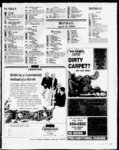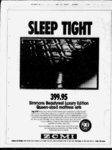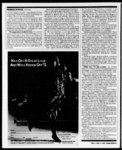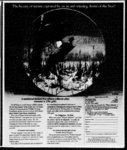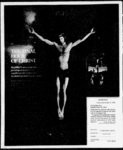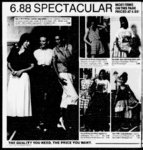| Show 1 oini alt galit Zribunc P1:11e Sunday Morning April 15 1990 Section Tribune Editorials Page 16 A Simplifying Taxes May Take Miracle Of Rites and Rights "He is risen" There probably are no three words more central to the Christian faith than these For most practicing Christians the season beginning with Lent and culminating in Holy Week and Easter Sunday is the most important of religious festivals The meaning of Easter for contemporary American culture as a whole is far from clear In a nation where religious freedom including the right not to practice or observe any religious creed or dogma has itself been enshrined in the supreme civil law from the nation's founding the significance of Easter is anything but universal This is not a weakness but a strength From its beginning the United States always has professed religious toleration and while the nation does not always measure up to this ideal on the whole it has freed itself from sectarian strife To their credit most Americans even those with strong personal religious faith have seen and upheld the wisdom of this policy and today the United States is home to the greatest religious and cultural diversity of its history As a result American Christians will celebrate the Easter holiday today in a variety of ways and many more Americans will pass the day without any religious ceremony at all As it happens this year's Easter celebration is unusual in that the holiday falls at the same time on the religious calendars of both the Eastern and Western rites of the church Coupled with the Jewish Passover which began Tuesday the past week has been an important one for people of many faiths and denominations Political events in Eastern Europe during the past six months in which churches often played a pivotal role have made this a particularly significant Easter in that part of the world Believers now are able to exercise a degree of religious freedom absent for more than four decades There undoubtedly have been and will be many thanksgiving prayers said for the resurrection of democracy too There was added powerful symbolism in the official apology for the Holocaust issued by the new East German Parliament on Thursday because it fell during the Jewish Passover celebration That event probably had added resonance in Utah because of another coincidence the "World of Anne Frank" exhibition In the Soviet Union Catholic Lithuania is observing a tense Easter this er? anglo-- American French-Canadia- English-speakin- n g was sung Some of those hard-liner- balked at s three of the prov- inces have indicated they will not support the amended constitution If they are not brought back into line by June 23 Meech Lake expires and the country is left without a constitution or a predictable future What may increase the chances of a split Canada now is that the biggest threats to small sovereignties military and economic dominarce by larger ones are fading A small nation in North America simply doesn't need large-scalmilitary support anymore The specter is diminishing for the sort of aggression that requires armies to stop As for economic dominance last e year's trade agreement US-Cana- al- lows Canadian companies more flexibility in striking their own deals with the United States far and away Canada's largest trading partner The pact which is phasing out tariffs on a number of goods has opened up new markets for Quebec which no longer needs to rely counso strongly on trymen to buy its products French Canadians may not embrace American culture but they are willing to grab its dollars Secession still seems a distant idea anywhere this side of the Baltics and Quebec may use Meech Lake's expiration only to extract more concessions from those Canadians wanting to preserve a united country Even if they were independent Quebeckers could seem to Americans as Canadian as the popular image has always projected in the States After all they have a major league baseball team too the Montreal Expos English-speakin- g Stating the Obvious If a recent Gallup Poll showing that 73 percent of those questioned favor warning labels on alcoholic beverages accurately reflects the nation's thinking this country has more problems than is generally conceded The poll commissioned by Advertising Age magazine and conducted two days after a bill proposing health warning labels was introduced in Congress shows that 42 percent of those polled favor bans on alcoholic beverage advertising Six out of 10 respondents said warning labels would have some effect on consumption of wine spirits and beer If this majority represents the American population it isn't difficult to see why it's often argued American education is failing Who in this country could be so ignorant as to not concede the adverse effects of alcohol? Who doesn't know that drunken drivers are a traffic hazard? Isnt it well understood by now that a pregnant woman's alcohol consumption can harm her unborn children? Who hasn't heard that heavy drinking and alcoholism lead to disease and death? It is an insult to the intellectual ea pacity of the average person to suggest these facts printed on bottles and cans would somehow disseminate new information But if the warning labels are to rea those benighted few who still don t know the dangers of excessive alcohol consumption it would be best to express appropriate precautions in single syllable words preferably those with rather than Latin roots so even the dullest can comprehend their meaning Such a warning should use short phrases no more than two sentences and each sentence should contain no more than a ztrict economy of words If the alert is thus simplified it will have greater impact on people who find a working brain a greater liability than an ingrown toenail Anglo-Saxo- n 1 c:Nlip i - t liFir 1 t Nm 0 ankallookN Newhouse News Service — Rep William Archer said last year he couldn't understand enough of the tax law and the instructions accompanying Form 1040 to prepare his own return and had hired an accountant to do so Since most Americans who have to file the long form do the same thing this wasn't particularly newsworthy except for one thing: Archer is a very bright man who sits on the committee of Congress that writes the tax laws he couldn't understand It isn't just taxpayers who don't understand the tax law as a recent Wall Street Journal article pointed out Accountants disagree on the tax law lawyers argue about the tax law and the IRS employees who are supposed to advise on the tax law give conflicting advice a goodly portion of which is wrong The problems do affect fewer people than they once did The tax reforms of 1988 took millions of people off the tax rolls and enabled more than a million others to switch from itemizing their deductions to taking standard deductions But 30 million individual taxpayers and 7 million businesses still itemize deductions and file long forms Said the Journal of this process "Does anybody really understand the US tax code? The law has become so comprehensive and so specific as to be in many areas utterly baffling not only to taxpayers but also to their accountants and attorneys and to the civil servants charged with administering it" The system is in real danger of breaking down The vast majority of citizens pay their taxes honestly either through payroll withholding or voluntary compliance with the law is rising however Taxpayers have always had confidence in their accountants As more of them learn that in many areas their accountants don't know the answer either they tend to shrug their shoulders and walk away Fred Goldberg the IRS commissioner was quoted in the Journal as saying "If taxpayers cannot understand our laws regulations and administrative rules or if compliance with those requirements is prohibitively expensive taxpayers will engage in shortcuts and not fully comply" It doesn't take much to get a taxpayer into the wilderness of rules Such small ventures as renting out a building gets the landlord into 'and of "active" vs "passive" the never-neve- r ger' r 'It rli-LI-) y 4 All io 15 &i te4 1 "I r"os A CJACI 7 r flA MT ? t 0 fil to z4v k Ad P tig lo- iV! - 7A4 A cc ?E VAX'S) 4:mo activities The IRS regulations explaining the difference take 196 pages For more complicated concepts there are thousands of pages of regulations Many taxpayers have trouble seeing the difference between a money market account at a bank and one at a stock brokerage but the IRS treats them differently The law got this complicated because Congress tried too hard to close every loophole In an effort to do so they dealt with very specific ways by which wealthy people were avoiding taxes To the very specific laws were added share of world product is no less today than it was 15 years ago — or before World War II for that matter Despite the supposed inroads of Asian manufactured goods here American industry's contribution to the national economic pie hasn't changed significantly either As for superpower stature Nye hardly needs to point out that ours is the only superpower left What has changed evidently is America's perception of itself It's true of course we can't exactly brag about Detroit's lackadaisical response to the challenge from Japanese (and European) automakers or the surrender of consumer electronics to various Asian manufacturers But instead of fighting back in the traditional American way the US response has been a cascade of rhetoric about level playing fields and structural impediments In short excuses That's not to say trade barriers haven't been a problem in the past or that all of them are gone today But most in fact have been removed although few Americans seem aware of it Clyde Prestowitz Jr the former US trade official who!) had a lot to do with getting them removed conceded in a recent lecture: "The US doesn't have a Japan problem It has a US problem" Certainly the Japanese agree The cover of a recent Newsweek magazine gives a good idea of how many Japanese view American trade complaints The picture was a squalling infant holding the Stars and Stripes the headline "What Japan Thinks of Us —A Nation of Crybabies?" About the same time the Japanese press obtained a list of proposals the Americans had made in the current round of talks on something called the Structural Impediments Initiative This proposal is a fuzzy tactic adopted by the Bush administration after it became clear William Sexton Nevsday's former Asia bit Why is the strongest nation in the history of the world allowing itself to look weak and witless in the face of Japanese competition — weak not simply in the marketplace (for industries constantly rise and fall) but in terms of national will of readiness to respond to problems? And what happens if other nations begin to of accept America's current weakness? Some people already do A senior foreign ministry official Seichi Kondo explained US trade pressures in the Yomiuri Shimbun Japan's biggest national daily: "We have to be understanding and tolerant of the United States at this moment in history To some extent American frustration reflects awareness of a relative national decline in prestige and power" But is the United States really in decline? Harvard Uni ersity's Joseph S Nye Jr in his new book "Bound to Lead: The Changing Nature of American Power" notes that the US n — cY) - 111Tr- --1f1t 1: :"r--- - 0 e )''111P1'-- - -'-- ed - io ( -- - kt - 41kb goo ez"1"-- -7 0110' tvotit 41 III i I b: qa tkr-- A oti " r -- 4 111 0 - 111 44 JIB- k - dailli lir- "' V'g$1 oivk tile :::iii: alf 11t4- - vs 11111l--- - Inv i 411keTliTow -- reau chief is now diplomatic correspondent for the newspaper j i- Law rillik -:- ( IA 11116111rnkl-41- Agra :::::g::i lb :::gi':4 '1 Ilk a s it tttirolb1 tvIzE 7t V I1 Oft mr It Illt? 4111 CtRitkl4 iken leilloriri-4111r Newsday TOKYO — Sosetso Nakamura an international airline stewardess before her marriage and an academic research librarian since knows Americans well She likes Americans But lately we puzzle her "We Japanese have always looked up to you" she told a couple of Americans visiting the Nakamuras' apartment in the Tokyo suburbs recently "You are such a great nation so rich so advanced so powerful How can you possibly be so frightened of Japan" A lot of people in Japan ask that question these days though not always so politely It's a question Americans should be asking themselves " 16 ems- - - rk YiNC)f)41 GI P Skt4 tit 1 Rm( su" tfcfpittoNsFNY 4 IF Via CPA - - a z v"4 A1‘41 zr'4117::filtIA-64040!00- By William Sexton - ? 014 those thousands of pages of painfully specific regulations There is some faint hope for the resurrection of sanity The gutsy chairman of the House Ways and Means Committee Dan Roshas asked for a study by the tenkowski IRS of ways in which the tax law could be simplified The hope is only faint for it is hard to combine simplification with the elimination of loopholes It would take a miracle But Easter reminds us that they happen Japan Bashing Reflects Bad US 1:2)"4gi 1 ' tuv)114 e in 6 vip WASHINGTON French) Meech Lake and now k t Otis Pike 4 Church undoubtedly is celebrating its renewed freedom the recent product of Soviet President Mikhail Gorbachev's evolving reform policies With these potent contemporary examples Americans should be reminded of their unusual right to practice or not to practice religion as each person's conscience dictates hindered only by the right of others to do the same anthem P É1 year However the Ukrainian dian national r i Oal Quebec's Familiar Pitch When President Bush made a quick visit to Canada last week to meet with Prime Minister Brian Mulroney most of thdt press coverage concentrated on Bush and Mulroney tossing out the first ball at a Toronto Blue Jays game which effectively overlooked an approaching Canadian storm capable of raining out several ball games A sort of passive neighborliness is probably an accurate reflection of how most Americans view Canada — friendly folks up North who just want to watch some baseball like anybody else However that is just what most upsets French Canadians in Quebec who comprise about a quarter of Canada's population Like its fatherland across the Atlantic French Canada views culture as something of a virus that slowly undercuts everything properly and significantly French As it has several times in the past talk about Quebec separating from the rest of Canada is moving back to the front burner and this time it may be brought to a full boil The current round is fueled by Canada's efforts to write its own constitution ending the last connection with the British Commonwealth Canada officially separated from Great Britain in 1982 but it has continued to operate under the terms of the British North America Act of 1867 When the new constitution was completed in 1987 it brought a predictable squawk from Quebec over bilingualism and other issues The result was something called the Meech Lake accords a series of constitutional amendments aimed at preserving culture But there are some stubborn English svakers in Canada At the Blue Jays Ontario boos game in were heard when one verse of the Cana Common Carrier Letters - Cie: Self-Imag- e trade nethat traditional gotiations weren't going to repair America's gaping trade deficit with Japan Just one example why: After the US bludgeoned aside Japan's barriers on automobile imports it turned out the Japanese really didn't want American cars Once the market was wide-opethey opted for the same foreign cars America's yuppies favored BMWs and Mer- cedes Detroit gained virtually nothing from all the diplomatic capital expended on the negotiations Yet rather than direct their concern to the evident problems of American-buil- t cars (and other potential exports) the authors of US trade policy have instead assumed that Japah is what needs fixing Specifically that Japan should completely revise its traditional retail sales system change its zoning laws throw the national budget into deeper deficit by doubling public works spending and abandon its in at least one foodeffort to be stuff rice And have the "blueprint" for all this — the word is US Trade Representative Carla Hills' — ready by the end of April Washington's latest effort isn't given the slimmest chance of denting the trade deficit So another round of protectionist pressure and probably even punitive sanctions appear likely But is there concrete action to correct America's budget deficit its lagging productivity the low savings rate that forces foreign investors to keep the capital flowing? Nowhere on the horizon Rather than deal with the country's own political indirection Americans bash Japan and the mood is turning ugly The Economist a British 14 eekly with generally conservative tendencies observes "a whiff Lf McCarthyism is in the air" when Japan is discussed in Washington If Harvard's Nye is correct that real American power in the world is relatively undiminished why then are Americans so nervous? "We often have tunnel vision" says Nye director of the Center for Science and International Affairs at Harvard's Kennedy School of Government "We tend to focus on something right in front of us the problem with microchip imports or TVs — and people take the loss or decline in one area and read it across the board" The fact that the United States is "the only country in the world which has strengths all across the board" is ignored Also he says "Americans are feeling nervous at the end of an era of certainty For 40 years our minds were grooved by focusing on one enemy and when that enemy goes away you look for the next one" Yoshiji Nogami head of the Japan Institute of Foreign Affairs agrees on the unsettled mood in America — and faults politicians for exploiting it "There is a sort of amorphous and unspecified fear on the part of a large proportion of the American population" Nogami says "Incomes aren't growing day care is a problem you can't afford a new car the garbage problem is piling up It's a sort of general frustration and initially the fear has nothing to do with Japan The American president of a successful Joint venture in the medical field offers another culprit The American businesses that went about it right and succeeded in Japan you don't hear them asking for all kinds of changes and concessions" he says "We're too busy going about our business here Its the losers who go to Washing ton and make all the noise" product-by-produ- ct n I |



























































































































